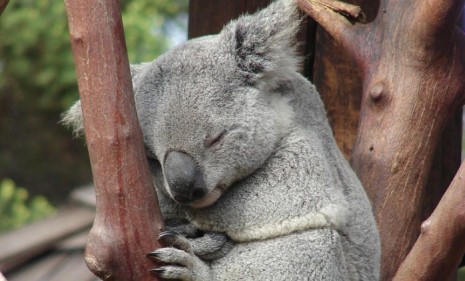Are STDs killing koala bears?
Australia's cuddly iconic mascot is being decimated by an unlikely villain: The sexually transmitted disease chlamydia. And that's not good news for tourism

A free daily email with the biggest news stories of the day – and the best features from TheWeek.com
You are now subscribed
Your newsletter sign-up was successful
The cuddly koala is facing a host of crises, but wildlife experts say it could be a virulent outbreak of the STD chlamydia that does the species in. And extinction is a real near-term possibility for Australia's national symbol and a key tourism draw. What's behind the unlikely-sounding threat to the koala, and what are people doing about it?
How dire is the koalas' situation?
Only 43,000 to 80,000 koalas are still alive, according to the Australian Koala Foundation, a conservation group; at the current rate of decline, they'll be extinct in 30 years. They're already "functionally extinct" along the "Koala Coast" in southeastern Queensland, says William Ellis, a researcher at the University of Queensland. A key factor: A chlamydia epidemic that's infected 50 to 80 percent of the koala population.
The Week
Escape your echo chamber. Get the facts behind the news, plus analysis from multiple perspectives.

Sign up for The Week's Free Newsletters
From our morning news briefing to a weekly Good News Newsletter, get the best of The Week delivered directly to your inbox.
From our morning news briefing to a weekly Good News Newsletter, get the best of The Week delivered directly to your inbox.
Really?
Yes. Although a sexual transmitted disease like chlamydia "would seem at odds with the animal's image as the cuddly emblem of Australia," says Larry Knowles at AOL News, koalas spread the disease through male-to-male and male-to-female sexual activity, as well as through nursing and other mother-to-child contact. The rate of infection has been high for some time, but seems to flare up when the animals are under stress.
What's stressing the koalas?
Development is rapidly shrinking their habitat and the supply of their dietary staple, eucalyptus leaves. Hotter, drier weather is also killing off eucalyptus trees. This is especially hard on koalas, since they are "notoriously fussy about what types of eucalyptus leaves they eat," says Bonnie Malkin in Britain's Daily Telegraph.
A free daily email with the biggest news stories of the day – and the best features from TheWeek.com
How is the chlamydia manifesting?
The disease is hard to detect until the animals are really sick. Specific symptoms include conjunctivitis ("pink eye"), urinary tract infections, kidney failure, and incontinence. Ominously, the disease can leave the koalas so weakened they no longer expend the energy needed for survival, and it has left up to 45 percent of female koalas infertile.
What is Australia doing to save the koala?
Treating visibly ill koalas with antibiotics, or euthanizing those too far gone, while struggling to find a chlamydia vaccine — despite fears a vaccine could do more harm than good. "While you might treat the chlamydia, you might make [the animals'] digestive tracts worse," says Peter Timms at Queensland University of Technology, who's working on a vaccine. Australia is also setting aside protected habitat for the koala.
Why hasn't this received more attention?
The country isn't exactly advertising the decline of its national symbol. Koalas are a valuable tourism draw — $1 billion a year's worth, according to one estimate — and the tourism industry doesn't want people to "see koalas with disease," says Timms. AOL's Knowles agrees: "What tourist, after all, would want to be photographed with an animal known for its chlamydia?"
Sources: AOL News, Gather, Daily Telegraph, Bayside Bulletin, ABC, Brisbane Times